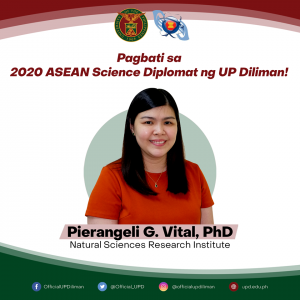(JUN. 24) — Pierangeli G. Vital, PhD, University Researcher at the UP Natural Sciences Research Institute (NSRI) was among this year’s 14 Outstanding ASEAN Science Diplomats.
Vital now joins the roster of eminent science and technology leaders in Southeast Asia.
The head of the NSRI Biological Research and Services Laboratory, Vital earned her PhD in Biology (specializing in Microbiology) in 2013 under the sandwich program of UPD and the International Environmental Research Institute, United Nations University and Gwangju Institute of Science and Technology, Korea. Her research interests are in environmental microbiology and food safety.
As an honoree, Vital is invited to attend the 4th ASEAN Science Diplomats Assembly (SDA), a 5-day event in 2021 designed to facilitate discussions between scientists and policymakers on their program and research priorities, and funding opportunities. SDA aims to strengthen the integration of science and diplomacy for the benefit of the ASEAN member states’ strategic capacities, policy goals and the development of solutions for societal challenges.
Vital is an ASEAN Science and Technology Fellow (ASEAN Foundation and USAID 2019-2020) and a Diplomate by the Philippine Academy of Microbiology (conferred in July 2019). Her other recognitions are the Philippine Society for Youth Science Clubs Ambassador for the Environment Award (June 2019), the Young Ambassador of the Year Award, International Society for Microbial Ecology (2018); and the Senior Scientist Research Fellow, Department of Agriculture – Bureau of Agricultural Research / NSRI (under the Postdoctoral and Senior Scientist Research Fellowship in Basic Research in Agriculture and Fisheries, 2017).
Vital has two ongoing research projects the Department of Agriculture funded where she serves as Project Leader.
“Development of Loop-mediated Isothermal Amplification (LAMP) – Lateral Flow Assay (LFA) – Based Kit to Detect Vibrio Infections in Fisheries” utilizes the LAMP-LFA (loop-mediated isothermal amplification – lateral flow assay), using nanogold technology for the detection of pathogenic Vibrio in fishes. The study also simplifies the DNA extraction methods and serves as an alternative to the costly commercially available extraction kits. The product is easy to use, yields fast and accurate results, and is economical to potential users.
“Microbial Source Tracking of Fecal Indicator Bacteria Escherichia coli Isolated from Fresh Produce in Luzon, Philippines” uses microbial source tracking, using fecal indicator bacteria Escherichia coli, to identify possible sources of contamination of various fresh produce from Luzon. Agricultural sources include irrigation waters, soil and fecal samples in two seasons (wet and dry). The results of the study can be a baseline for determining the risk associated with the contamination of agricultural resources, and establishing data to conduct regulation and policies anchored on eliminating and controlling these microbial pathogens.
ASEAN Science Diplomats as described on its Facebook page “is a group of Outstanding Scientists and Engineers who are trained and capacitated to bring science and policy to the community.”

